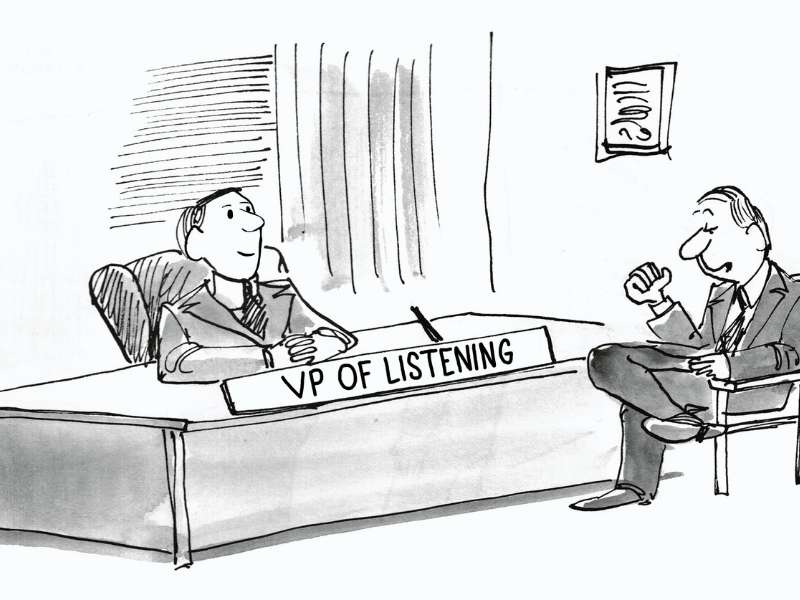If someone is going through a difficult time in their life, it might help them to talk. If there is something they are finding difficult to think through, or something that is rather upsetting, then now might be the time for them to confide in a trusted friend.
This is a person that someone may know well and who is able to listen attentively and non-judgementally to what they are saying and not interrupt them with their own opinions or judgements. It can be difficult to hold back personal opinions but that is exactly what is required at such times from a confidante.
However, a trusted friend who is also a good listener is a rare breed of person. Of course, you may think that you are a good listener but active listening is an ability to put your own thoughts on hold whilst giving the speaker your full attention.
Making the Time to Listen
 Active listening takes time and one cannot always stop all else in order to listen attentively. In such an instance, therefore, you would need to sensitively postpone the conversation to another time in the near future without the person concerned feeling rejected. In an ideal world, we would always be able to make time to listen but very often our busy lives do not give us the opportunity to do this.
Active listening takes time and one cannot always stop all else in order to listen attentively. In such an instance, therefore, you would need to sensitively postpone the conversation to another time in the near future without the person concerned feeling rejected. In an ideal world, we would always be able to make time to listen but very often our busy lives do not give us the opportunity to do this.
And what about the person who wants to talk? They may have been feeling anxious and upset for some time but are concerned about approaching you on a personal matter and taking up your time. They know you are busy and have plenty of other things on your mind. Nevertheless, one day, they may summon up the courage to ask if you have the time to talk.
The manner in which you respond to them will make all the difference to helping them feel valued and worthwhile. If that particular moment is inconvenient then it could be really helpful to suggest a firm time later in the day. The main point is not to be dismissive but to show positive interest and concern where appropriate.
Active listening is a communication technique used in counselling, training and conflict resolution, which requires the listener to feedback what they hear to the speaker, by way of re-stating or paraphrasing what they have heard in their own words, to confirm what has been said and moreover, to confirm the understanding of
both parties.
To use the active listening technique to improve interpersonal communication, one
puts personal emotions aside during the conversation, asks questions and paraphrases back to the speaker to clarify understanding, and one also tries to overcome all types of environmental distractions. Judging or arguing prematurely is a result of holding onto a strict personal opinion. This hinders the ability to be able to listen closely to what is being said. Eye contact and appropriate body language are seen as important components to active listening. The stress and intonation may also keep them active and away from interruptions.
Professional Counselling
 Being a good listener does not require you to be a counsellor nor does it remove the need for people to seek professional counselling support where appropriate. Professional counsellors are trained to listen and to support people through difficult personal issues and to propose changes in order to better deal with current and/or future problems and challenges. Their remit is to improve the life of the person seeking help and provide a more objective viewpoint with a greater perspective on how to deal with their problems.
Being a good listener does not require you to be a counsellor nor does it remove the need for people to seek professional counselling support where appropriate. Professional counsellors are trained to listen and to support people through difficult personal issues and to propose changes in order to better deal with current and/or future problems and challenges. Their remit is to improve the life of the person seeking help and provide a more objective viewpoint with a greater perspective on how to deal with their problems.
In-House Resources
 Your company may already have an in-house or external counselling service or maybe an Occupational Health department. If so, trained professionals may be available to give skilled guidance on specific goals and issues that the individual may want to work on, or to learn effective strategies to make their life better and healthier.
Your company may already have an in-house or external counselling service or maybe an Occupational Health department. If so, trained professionals may be available to give skilled guidance on specific goals and issues that the individual may want to work on, or to learn effective strategies to make their life better and healthier.
In all our lives, there is a place both for an attentive listener and sometimes also for a professional counsellor. The phrase of ‘a problem halved is a problem solved’ comes to mind and, of course, it doesn’t really matter where the help or support comes from, provided it is helpful to the person who requires it.
Key Points
- Being able to talk through a problem is important
- Try to always be an active listener
- We all need a ‘sounding board’ from time to time




